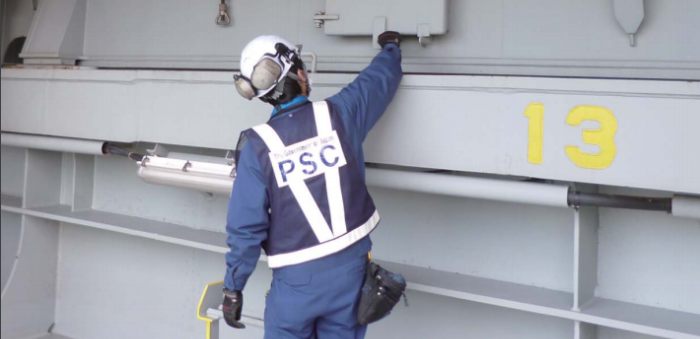Viña del Mar MoU announced the launch of a joint Concentrated Inspection Campaign (CIC), starting from 1 June 2018 and ending on 31 August 2018, to ensure compliance with SOLAS Chapter II-1, on the safety of auxiliary machinery, especially the working condition and maintenance of the auxiliary engines, auxiliary equipment and their related alarm systems.
As informed, special attention will be given to familiarity of the crew with safety and emergency procedures with regard to these systems. The three-month inspection campaign will be implemented in a different period from those scheduled by other memoranda for 2018, as it is not be related with Annex VI of MARPOL.
The auxiliary machinery installations will be verified in more detail for compliance with the mentioned scope of the CIC during a regular Port State Control inspection conducted under the regional ship selection criteria.
Port State Control Officers (PSCOs) will use a list of 12 selected items to verify critical areas for the auxiliary machinery installations, some of which are related to documentation, auxiliary engines and equipment, crew familiarization and operational controls. For this purpose, PSCOs will use a questionnaire listing a number of items to be covered during the concentrated inspection campaign.
When deficiencies are found, actions by the port State may vary from recording a deficiency and instructing the master to rectify it within a certain period to detaining the ship until serious deficiencies have been rectified. The results of the campaign will be analyzed and findings will be presented to the Members on the next Committee Meeting for approval and later submission to the IMO and the other MOUs.
In addition, the US Coast Guard Office of Commercial Vessel Compliance initiated a Concentrated Inspection Campaign, running from 2 May 2018 – 1 May 2019, for all US-flag vessels fitted with open lifeboats. The purpose of the CIC is to ensure that these critical lifesaving appliances are maintained in working order and ready for immediate use.
During this period, USCG Marine Inspectors will perform a more detailed inspection of open lifeboats and related launching appliances using the attached checklist as a guide in conjunction with regularly scheduled Coast Guard Inspections (exclusive of drydock). A final report of this CIC will be later made public.
In its 51st Committee meeting in Cascais, Portugal, in early May, Paris MoU agreed to an information campaign by issuing a “Letter of Warning” starting 1 January 2019, to encourage timely compliance ahead of the new maximum limits for sulphur in ships fuel oil, entering into force on 1 January 2020.
Paris MoU also approved the questionnaire for the CIC on MARPOL Annex VI to be conducted jointly with the Tokyo MoU. The CIC aims at checking the compliance with requirements for the prevention of air pollution from ships. The CIC will be carried out from September to November 2018 and the questionnaire will be published in August.
The additional questionnaire is expected to be published at the beginning of August to raise awareness for compliance with requirements on the prevention of air pollution from ships.World statistics for the last three years show main deficiencies related to incinerator and record book of engine parameters (with deficiency code):
- Record book of engine parameters (14206)
- Incinerator including operations and operating manual (14608)
- International Air Pollution Prevention Certificate (01124)
- Ozone-depleting substances (14611)
- Engine International Air Pollution Prev. Cert. (01125)
- Ship Energy Efficiency Management Plan (01328)
- Operational procedures for engines or equipment (14610)
- International Energy Efficiency Certificate (01138)
- Bunker delivery notes (14604)
- Fuel changeover procedure (14615)
Similar CICs on MARPOL VI will run in the Black Sea MoU and the Indian Ocean MoU on 1 September-30 November, to check compliance with air pollution prevention requirements and to boost awareness of the 2020 sulphur cap.






























































